Can you use Canon EF lenses on mirrorless cameras? This is a question that comes up a lot, and the answer is not always straightforward. In this article, we will provide a comprehensive guide to help you decide if using EF lenses on your mirrorless camera is the right choice for you. We’ll answer some common questions about lens compatibility and give you some tips on how to get the most out of your Canon EF lenses when shooting with a mirrorless camera. Let’s get started!
Which Canon Mirrorless Cameras Can Use EF And EF-S Lenses?
The short answer is that all Canon mirrorless cameras can use EF and EF-S lenses. However, there are a few things to keep in mind when using these lenses on a mirrorless camera. First, you will need an adapter to mount the lens to the camera body. Second, the autofocus and image stabilization features of the lens may not work with all Canon mirrorless cameras. Finally, you may experience some vignetting (darkening of the corners of the image) when using EF or EF-S lenses on certain Canon mirrorless cameras.[1]

With that said, let’s take a closer look at each of these issues to see if using Canon EF lenses on your mirrorless camera is right for you.
What Lens Adapter Do I Need?
EF/EF-S To EF-M Mount
The EF-M mount was introduced in 2012 with the Canon EOS M mirrorless camera. The mount is designed specifically for use with Canon’s line of mirrorless cameras and has a shorter flange distance than the EF or EF-S mounts. This means that you cannot directly attach an EF or EF-S lens to an EF-M mount camera body without an adapter.
There are a few different types of adapters available on the market that allow you to attach an EF or EF-S lens to an EF-M mount camera. The most basic adapters simply allow you to physically attach the lens to the camera body without any electronic connection between the lens and the camera. This means that you will not be able to use any of the lens’ electronic functions, such as autofocus or image stabilization.
There are also adapters available that provide an electronic connection between the lens and the camera body. These adapters allow you to use all of the lens’ electronic functions, including autofocus and image stabilization. However, they can be more expensive than the basic adapters.
If you’re using a basic adapter, you will need to focus the lens manually. You can also use manual exposure settings or set the camera to fully manual mode when using an EF or EF-S lens on an EF-M mount camera body.[1]
EF/EF-S To RF MOUNT
If you want to use Canon EF or EF-S lenses on your mirrorless camera, you’ll need an adapter. Canon makes its own adapters, which are high quality and easy to use. The Canon EF-EOS R Mount Adapter is for using EF and EF-S lenses on EOS R cameras, and the Canon Control Ring Mount Adapter EF-EOS M is for using those same lenses on EOS M cameras. Both adapters retain full lens functionality, including autofocus and image stabilization.

There are also a number of third-party options available. Some are less expensive than the Canon adapters, but they may not offer the same level of quality or functionality. It’s important to do your research before purchasing an adapter, to make sure it’s compatible with your camera and lenses and that it offers the features you need.
Once you have the appropriate adapter, using Canon EF or EF-S lenses on your mirrorless camera is easy. Just attach the lens to the adapter and then mount the adapter on your camera body. The camera will automatically recognize the lens and adjust its settings accordingly. You can then start shooting as usual.[1]
What Happens If I Use An EF-S Lens On A Full Frame RF Mount Camera?
If you’re looking for a versatile all-in-one lens to get started with, the Sigma 16mm F/14 DC DN Contemporary Lens is a great option. It’s compact and lightweight, making it easy to carry around, and it offers excellent image quality. For something a little longer, the Tamron 17-28mm f/28 Di III RXD Lens is also a great choice.[1]
What Is The Crop Factor When Using An EF-S Lens On An RF Mount Camera?
When using an EF-S lens on an RF mount camera, the image will be cropped by a factor of x. This means that the field of view will be reduced and the distance between you and your subject will appear greater. For example, if you are using a 50mm lens on an APS-C sensor camera, the effective focal length would be 75mm.[1]
Canon EOS R

The EOS R is Canon’s first full-frame mirrorless camera, and it’s a pretty solid option if you’re looking to get into the world of mirrorless photography. One of the main questions people have about the EOS R is whether or not they can use their existing Canon EF lenses with the camera. The answer is yes! You can use Canon EF lenses on the EOS R, but there are a few things you need to know before you do.[1]
What Happens When I Use An EF Lens On An RF Mount Camera Body?
When you use an EF lens on an RF mount camera body, the image circle produced by the lens will not be big enough to cover the entire sensor. This results in a cropped image that is missing some of the edges and corners.In addition, because the EF lens was designed for a full-frame camera, using it on a crop sensor camera will result in a higher degree of vignetting (darkening of the corners).Lastly, using an EF lens on an RF mount body will prevent you from taking advantage of certain features like In-Body Image Stabilization (IBIS) and electronic aperture control.So while you can technically use an EF lens on an RF mount camera body, it’s not something we recommend unless you absolutely have to.[1]
What Happens If I Use An EF-S Lens On An EF-M Camera?
If you attempt to use an EF-S lens on an EF-M camera, the image will appear cropped. This is because EF-S lenses are designed for APS-C sensors, which are smaller than full frame sensors. TheEF-M mount is also slightly different, so you won’t be able to attach an EF-S lens directly to an EF-M camera.
There are a few ways to get around this issue. One option is to use an adapter, such as the Canon Mount Adapter EF-EOS M. This adapter will allow you to attach any EF or EF-S lens to your EF-M camera. Keep in mind that using an adapter will add some extra bulk to your camera setup, and you may also lose some autofocus capabilities.
Another option is to use a mirrorless camera with an adapter that allows you to use EF lenses. This way, you can keep your Canon lenses and still use them on a mirrorless camera. Some popular options include the Sony Alpha a6000 with the LA-EA adaptor or the Panasonic Lumix GX85 with the DMW-MAFHD35 adaptor.
Can I Use EF-M Lenses On RF Mount Cameras?

The short answer is no. The EF-M mount was designed specifically for Canon’s mirrorless APS-C cameras, and as such, the lenses are not compatible with Canon’s full frame mirrorless cameras. That said, if you have an EF or EF-S lens that you’re looking to use on a Canon mirrorless camera, there are a few adapters that can make this possible.
Keep in mind that using an adapter will add some additional bulk to your camera setup, and may impact autofocus performance. Additionally, any electronic features of the lens (such as image stabilization) will likely not work when used with an adapter.[1]
Potential Drawbacks of Using Adapters
The main potential drawback of using an adapter to use Canon EF lenses on mirrorless cameras is that it can introduce some additional complexity and potential issues.
Another potential issue is that not all adapters are created equal, and some lower-quality adapters might not provide reliable electrical connections or might not fit as snugly onto the camera body, leading to increased risk of damage or accidental detachment.[2]
The Advantages of a Lens Adapter
There are a few reasons you might want to use a lens adapter. The most common reason is that you already have a set of Canon EF lenses and don’t want to invest in a new set of lenses for your mirrorless camera. Another reason could be that you prefer the image quality of Canon EF lenses over the native lenses available for your mirrorless camera.
Either way, using a lens adapter can give you more flexibility with the types of lenses you can use on your mirrorless camera. In this article, we’ll answer some common questions about using Canon EF lenses on mirrorless cameras and give you some helpful tips on getting the most out of your setup.[3]

FAQ
Can you put a DSLR lens on a mirrorless camera?
The simple answer is yes, you can use DSLR lenses on mirrorless cameras. However, there are a few things to keep in mind before you do so. For example, Canon EF lenses will not mount directly onto a Sony E-mount camera body. You’ll need an adapter to do so. Additionally, using a DSLR lens on a mirrorless camera may result in reduced image quality due to the different sensor sizes between the two types of cameras. Finally, you’ll likely lose some autofocusing capabilities when using a DSLR lens on a mirrorless camera.
How well do EF lenses work on mirrorless?
In general, Canon EF lenses work well on mirrorless cameras. However, there are a few things to keep in mind when using them:
- The autofocus may not be as fast or accurate as it is on Canon DSLRs.
- The image quality may be slightly lower than if you were using native mirrorless lenses.
- You may need an adapter to attach the lens to the camera body.
Overall, though, using Canon EF lenses on mirrorless cameras is a perfectly viable option if you’re looking to save some money or already have a collection of EF lenses. Just be aware of the potential drawbacks before making the switch!
Why are mirrorless cameras better than DSLR?
There are a few reasons why mirrorless cameras have been gaining in popularity lately. For one, they tend to be lighter and more compact than DSLRs, making them ideal for travel photography. They also tend to have faster autofocus systems and can shoot at higher frame rates than DSLRs. And because they don’t have a mirror, they’re quieter, which is great for candid street photography or wildlife shots.
Will DSLR be obsolete?
The simple answer is no. There are still plenty of reasons to own a DSLR, and they’re not going anywhere anytime soon. However, mirrorless cameras are becoming more popular every day, and for good reason. They offer many of the same benefits as DSLRs, but they’re usually smaller and lighter, making them more portable. Additionally, mirrorless cameras have shorter flange focal distances than DSLRs, which means that you can use a wider variety of lenses with them. So, if you’re thinking about switching to a mirrorless camera or you already have one and you’re wondering if you can use your Canon EF lenses with it, read on for everything you need to know.
Why is everyone going mirrorless?
The main reason people are making the switch to mirrorless cameras is that they are smaller and lighter than DSLRs. Mirrorless cameras have interchangeable lenses, just like DSLRs, but they don’t have a reflex mirror. This means that the camera body can be much smaller.
Another advantage of mirrorless cameras is that they tend to have better autofocus systems than DSLRs. This is because the autofocus system is built into the sensor, rather than being a separate component in the camera body. This means that mirrorless cameras can focus more quickly and accurately than DSLRs.
Is the camera industry dying?
No, the camera industry is not dying. In fact, it’s thriving. The market for mirrorless cameras is growing exponentially, and there are more and more options available every day. With that said, there are still a lot of people who are hesitant to switch to mirrorless because they’re invested in Canon EF lenses.
Useful Video: Canon Mirrorless – adapting EF lenses VS native RF?
Conclusion
So, can you use Canon EF lenses on mirrorless cameras? The answer is yes, but there are a few things to keep in mind. First, you’ll need an adapter to mount the lens on the camera body. Second, autofocus may not be available with all lenses. And finally, using an adapted lens may result in some image quality degradation.
With that said, using Canon EF lenses on mirrorless cameras can still be a great way to get started with interchangeable lens photography. It’s a budget-friendly option that allows you to experiment with different focal lengths and explore the world of creative photography. So go ahead and give it a try! Who knows, you might just fall in love with it. Thanks for reading!
References:
- https://www.photographypursuits.com/can-you-use-canon-ef-and-ef-s-lenses-on-mirrorless-canon-cameras/
- https://thesweetcamera.com/use-canon-ef-lenses-on-mirrorless/
- https://www.howtogeek.com/686190/should-you-use-a-lens-adapter-with-a-mirrorless-camera/

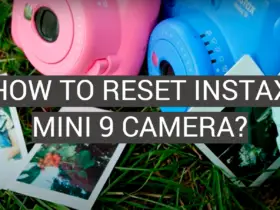
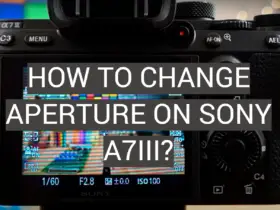
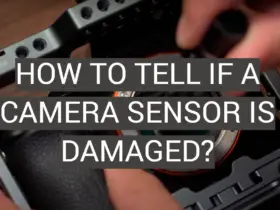


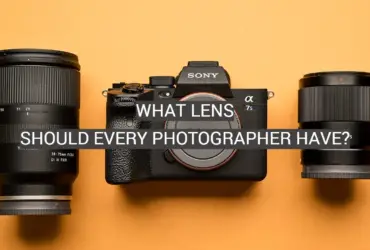
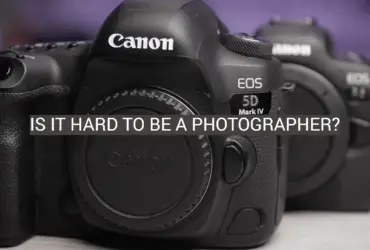
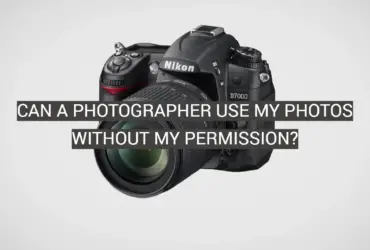

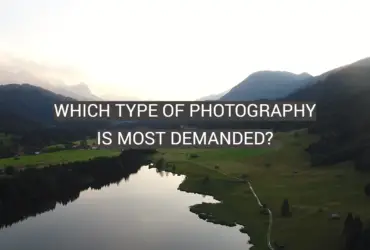

Leave a Reply